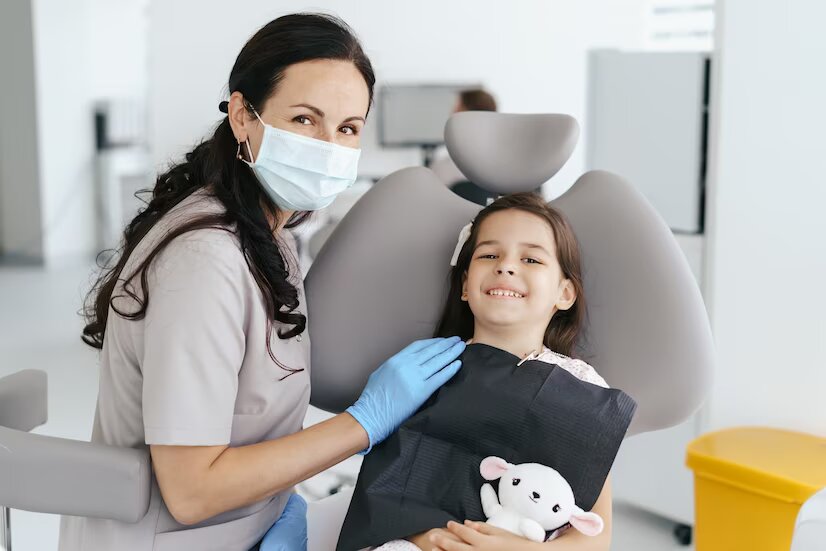
Children’s Preventive Care Dentistry: Building Healthy Smiles For A Lifetime
Good oral health habits start early in life, and children’s preventive care dentistry plays a vital role in establishing a foundation for lifelong oral health. Preventive care for children focuses on education, early intervention, and regular dental check-ups to ensure optimal dental health as they grow. In this article, we will explore the importance of children’s preventive care dentistry, the key components of preventive care, and how it sets the stage for healthy smiles that last a lifetime.
Why Is Children’s Preventive Care Dentistry Important?
Children’s preventive care dentistry is crucial for several reasons:
- Preventing Dental Issues: Regular preventive care visits allow dentists to identify and address potential dental issues before they progress. Early intervention can prevent the development of cavities, gum disease, and other oral health problems.
- Establishing Good Oral Health Habits: Children learn proper oral hygiene techniques, such as brushing and flossing, through education and guidance during preventive care visits. These habits lay the foundation for a lifetime of good oral health practices.
- Monitoring Growth and Development: Regular check-ups enable dentists to monitor the growth and development of a child’s teeth and jaws. This allows for the early detection of any abnormalities and the implementation of appropriate interventions if needed.
- Promoting Positive Dental Experiences: By introducing children to the dental office at an early age and creating positive experiences, preventive care dentistry helps reduce dental anxiety and fear. This sets the stage for a lifetime of comfortable dental visits.
Key Components Of Children’s Preventive Care Dentistry
Children’s preventive care dentistry encompasses several key components:
1. Regular Dental Check-Ups
Regular dental check-ups are essential for children. Dentists will perform a comprehensive examination of the child’s teeth, gums, and oral tissues. This allows for the early detection of any dental issues, such as cavities or orthodontic concerns. Check-ups also provide an opportunity to educate parents and children about proper oral hygiene techniques. The toothbrush a child uses is not capable enough to reach every corner of the mouth. As a result, teeth remain untouched and, as a result, unhygienic.
2. Dental Cleanings
Professional dental cleanings are typically performed during preventive care visits. Dental hygienists will gently remove plaque and tartar buildup from the child’s teeth, ensuring a clean and healthy oral environment. Cleanings help prevent cavities and gum disease by removing the bacteria that contribute to these conditions. Dental cleanings encompass the thorough use of dental materials to effectively treat teeth that catch plaque. Make sure you teach kids to brush their teeth twice in a single day, and floss is equally important for them.
3. Fluoride Treatments
Fluoride treatments are often part of preventive care for children. Fluoride helps strengthen tooth enamel, making it more resistant to decay. Dentists may apply a fluoride varnish or gel to the child’s teeth, providing added protection against cavities. Your child can either get a dental sealant or fluoride treatment from your dentist when they are undergoing a dental preventive treatment.
4. Dental Sealants
These are thin, protective coatings generally applied to the chewing elements present near the back teeth (both premolars and molars). Sealants are no less than a barrier, preventing food particles and bacteria from getting trapped in the deep grooves and pits of the teeth. This significantly reduces the risk of cavities in these susceptible areas.
5. Education And Guidance
Children’s preventive care visits focus on education and guidance for both parents and children. Dentists and dental hygienists provide information on proper oral hygiene practices, including brushing and flossing techniques. They may also discuss diet and nutrition, emphasizing the importance of a healthy diet for oral health.
6. Orthodontic Evaluation
Regular preventive care visits include orthodontic evaluations to monitor the child’s dental development. Dentists can identify any orthodontic concerns, such as misaligned teeth or bite issues, and recommend appropriate interventions if necessary. Early intervention can help prevent more extensive orthodontic treatment later on.
7. Additional Tips On Dieting
Parents might ask for additional dieting tips from their dentist, especially if the child needs to stay away from particular foods. Ask the dentist to provide a list of all healthy foods.
Tips for Promoting Children’s Oral Health at Home
In addition to regular preventive care visits, parents can promote children’s oral health at home:
- Establish a Daily Oral Hygiene Routine: Encourage children to brush their teeth at least twice a day and floss once a day. Use a soft-bristled toothbrush and fluoride toothpaste appropriate for their age.
- Monitor Diet and Limit Sugary Foods and Drinks: Limit the consumption of sugary foods and beverages, as they can contribute to tooth decay. Encourage a balanced diet rich in fruits, vegetables, and calcium-rich foods.
- Supervise Brushing and Flossing: Until children have the dexterity to brush and floss effectively on their own, parents should supervise and assist with oral hygiene routines.
- Promote Regular Dental Visits: Emphasize the importance of regular dental check-ups and create a positive attitude towards dental visits. Make dental appointments a regular part of their healthcare routine.
- Lead by Example: Be a role model for good oral hygiene habits. Children are more likely to adopt healthy behaviors when they see their parents practicing them consistently.
Conclusion
Children’s preventive care dentistry is an essential component of maintaining optimal oral health from an early age. By emphasizing regular check-ups, dental cleanings, fluoride treatments, sealants, and education, parents and dental professionals can work together to establish a solid foundation for lifelong oral health. Encouraging good oral hygiene habits and providing positive dental experiences sets the stage for children to maintain healthy smiles that last a lifetime.
Checkout the iGrin Pediatric Dentistry to learn more about preventative care for children.
Have A Look:-
Already have an account?
Sign In
Create your account
User added successfully. Log in










